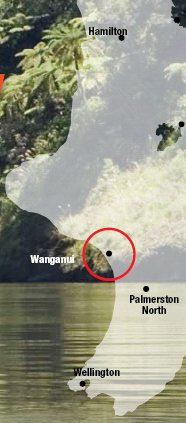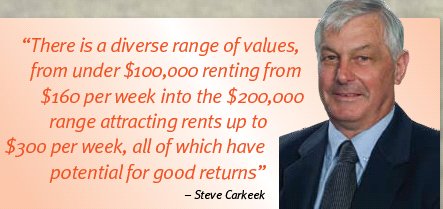Wanganui - or Whanganui - is an urban area and district located on the South Taranaki Bight close to the mouth of the Whanganui River.
 Founded in 1840, it is one of New Zealand's oldest towns. The town grew rapidly in the early years but by the mid-1980s a number of government offices moved to Palmerston North and many businesses downsized or closed. Most of the town lies on the river's northwestern bank, although some suburbs are located on the opposite side of the river. Aside from around 3,800 people, most of the 44,000-strong population resides in the city.
Founded in 1840, it is one of New Zealand's oldest towns. The town grew rapidly in the early years but by the mid-1980s a number of government offices moved to Palmerston North and many businesses downsized or closed. Most of the town lies on the river's northwestern bank, although some suburbs are located on the opposite side of the river. Aside from around 3,800 people, most of the 44,000-strong population resides in the city.
A significant proportion of the local economy relates directly to Wanganui's prosperous farming area. The city is also home to various manufacturing and engineering operations, and the Wanganui Port, once the centre of industrial transport but now reduced in traffic. Tourism has become a major growing income stream.
Infometrics estimate that the Wanganui economy contracted 0.60% over the 2009 calendar year compared to a 1.60% contraction nationally. The first time since 1999 that Wanganui had performed more strongly than the national average, this result was driven by some pick-up in the agricultural sector as commodity prices lifted and the region recovered from the 2007/08 drought.
"One of the biggest drags for the area has been its population, which has either been flat or falling every year since 1996," said Infometrics managing director, Gareth Kiernan.
Wanganui's population has a disproportionately low number of 20 to 39-year-olds, which is counterbalanced by higher-than-average numbers of 10 to14-year-olds and particularly higher numbers of people 65-plus. Kiernan surmises that Wanganui's perceived lack of employment opportunities, plus its reputation as an area for retirees, could account for these figures.
Given the performance of commodity prices over the last 15 months, Infometrics reports relative optimism about growth prospects for Wanganui over the next couple of years. Strong lamb and dairy prices could gradually filter through into more spending and improved economic activity in the area. The effect is likely to be gradual, however, due to farmers' caution around spending, rising financing costs and some push to reduce debt levels.
Low mortgage rates and modest price falls led to a rebound in sales between April last year and January this year, but uncertainty ahead of the Budget and the relatively sluggish nature of the economic recovery has taken some of the life out of the housing market. Prices still look to be holding up relatively well despite the recent weakness in sales, which may be a reflection of the export price/income effect.
According to Kiernan, Wanganui was one of the stereotypical areas over the last decade where rental yields looked very attractive so investors poured in to buy property once the perceived opportunities had dried up in the main centres. The gross rental yield was as high as 10.30% in 2003, but had plunged to 5.30% within three years.
"Even now, with prices rebounding over the last year and rental growth being negligible, yields have reached a new record low of 5% (the average over the last 13 years is 7.50%). With the depreciation changes in the Budget forcing landlords to place closer attention on cash flow, there could be a downward correction in rental property values in Wanganui."
He believes that over the medium-term, it is difficult to see Wanganui's population growth and economic fortunes exceeding those of either Palmerston North, which has a greater critical mass and a broader-based economy, or the broader based New Plymouth, with the twin drivers of oil and dairy.
 "Previously Wanganui has been an area to buy a cheap rental if you didn't have a lot of capital, and a place that you'd probably be able to get cash flow positive properties."
"Previously Wanganui has been an area to buy a cheap rental if you didn't have a lot of capital, and a place that you'd probably be able to get cash flow positive properties."
He said that with property values at their currently high level, it's easy to envisage a 10 to 15-year period where house prices are flat in nominal terms (therefore falling in real terms) as the market realigns following the excessive run-up in prices of the last decade.
"In other words, it's not somewhere I would be investing for capital gains and with yields looking relatively low as well, the cash flow position doesn't look great either."
QV figures show the latest average sales price for Wanganui as $229,340. According to the QV house price index, house prices reached a peak in Wanganui in November 2007. Values then dropped by 10.40% to a low in June 2009. Since then values have increased by 3.80% and now sit 7% below their peak.
During the peak of the market in 2007 there were around 300 house sales per quarter in Wanganui. This dropped to around 110 sales per quarter in 2008. During 2009 volumes recovered a little to around 130 per quarter. The first quarter of 2010 had about 120 house sales, a similar number to the first quarter last year.
Agents report that buyers are taking longer and are more cautious in their purchasing decisions. The residential investment market appears to have stalled with very few buyers and a large number of rental properties on the market. QV valuer, Robert Lust, said it was still too soon to determine the effect of the May Budget on buyer/seller sentiment, but QV assumes any change will be minimal.
The Wanganui District had 17 mortgagee sales in 2009 and 18 in 2008 - a significant increase from 2007.
"However there seems little evidence to suggest the district is experiencing any upsurge in mortgagee sales, at least for the first six months of this year," said Lust.
Very little spec building is being undertaken at present as the cost of building is currently higher than the cost to purchase an improved property. Lust said this problem appears to be exacerbated when the land is in a lower-value location such as Wanganui.
"With interest rates predicted to rise and no real increase in the population base forecast, we don't see any major change in building activity in the short to medium term."
Steve Carkeek, principal of Wanganui First National Real Estate, said Wanganui was best seen as a 'buy and hold' market, rather than investing for capital gain. 
"There is a diverse range of values, from under $100,000 renting from $160 per week into the $200,000 range attracting rents up to $300 per week, all of which have potential for good returns."
He said that during the boom an influx of out-of-town investors were attracted by the very low values, perceived capital gain (which many did accomplish) and high returns at the time. More recently, the market has reverted mostly to local clients. However, since the Budget an increase in inquiry from investment and lifestyle buyers has occurred.
According to Philip Kubiak, local branch manager for Property Brokers, Wanganui currently has an oversupply of all property types. Selective investment opportunities exist, particularly for investors imbued with patience in the negotiating phase, and completion of property investigations before offering to purchase and then with minimum days of due diligence.
"Reduced prices now give much better options than the 'boom' years when rents needed to catch up to market. That has now occurred and rents have not followed the market price down."
Locum professionals are a major part of the higher-end rental market. Student accommodation, which is highest in the central area, covers a wide range of age and rental prices. Kubiak said a supply of tenants and lessees from service industries and government contracts is assured.
"However they are highly selective and establish longer term leases/rentals."
Central and inner suburbs have greater rental ability and, as a result, good residential property has high occupancy rates with quality tenants, if well selected. Apartments, which are relatively new in number in Wanganui, have high occupancy rates. Lower priced outer areas do attract valuable tenancies and in a different price bracket.
Property investor, Clarry Inwood, reckons it's possible for a smart investor to achieve a 10% yield in Wanganui. Inwood, who has been investing in the local residential market for 12 years, owns 40 properties. He said yields have improved considerably over the last year.
With a 2% population growth since 1966 and an economy that today is mostly internally driven, Wanganui is still considered an investment option. The property market offers affordable housing for first home buyers and provides opportunities for investors who are looking for cash flow properties though these may not achieve the same capital gains as the larger urban centres.

![[TMM Podcast] Yelsa serves up “marine reserve” of property buyers](https://www.goodreturns.co.nz/pics/mike%20harvey.jpg)



 Search
Search Founded in 1840, it is one of New Zealand's oldest towns. The town grew rapidly in the early years but by the mid-1980s a number of government offices moved to Palmerston North and many businesses downsized or closed. Most of the town lies on the river's northwestern bank, although some suburbs are located on the opposite side of the river. Aside from around 3,800 people, most of the 44,000-strong population resides in the city.
Founded in 1840, it is one of New Zealand's oldest towns. The town grew rapidly in the early years but by the mid-1980s a number of government offices moved to Palmerston North and many businesses downsized or closed. Most of the town lies on the river's northwestern bank, although some suburbs are located on the opposite side of the river. Aside from around 3,800 people, most of the 44,000-strong population resides in the city. "Previously Wanganui has been an area to buy a cheap rental if you didn't have a lot of capital, and a place that you'd probably be able to get cash flow positive properties."
"Previously Wanganui has been an area to buy a cheap rental if you didn't have a lot of capital, and a place that you'd probably be able to get cash flow positive properties."
